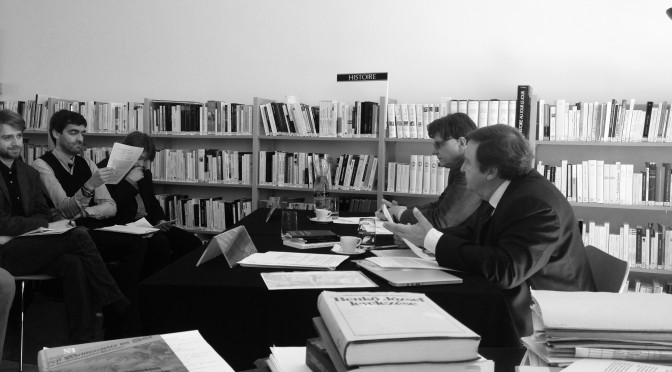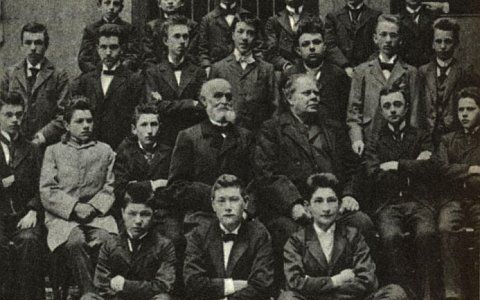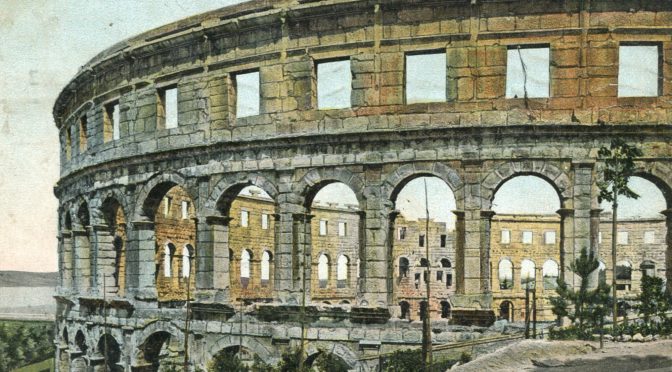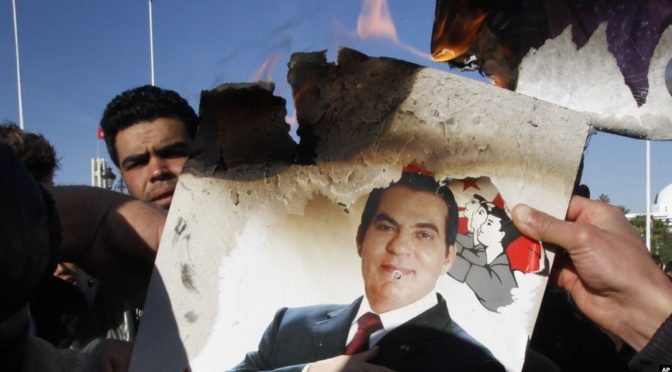Organized by the Institute of Philosophy (Department of Contemporary Continental Philosophy) of the Academy of Sciences in the Czech Republic, an international conference will deal with the French Tradition of Philosophy of Body and Life. The conference seeks to shed light on its history: from its birth in Descartes’s and Maine de Biran’s works, to its many variations in the philosophy of Bergson, Canguilhem, Ruyer, and Merleau-Ponty, and to its revival within phenomenology and its main critics, such as Deleuze, Ricoeur and Foucauld, who helped shifting the core question from body to life. Gathering several–mostly French and Czech–specialists, the conference thus aims at revealing through what path philosophy of body turned into a “tradition”, if not an obsession of French philosophy, leading to a specific questioning of sciences, ethics, power, and gender studies.
Archives
French-Czech Workshop in History
Thursday, May 7th 2015, from 9:10 at the CEFRES
Alain de LIBERA, Professor at Collège de France
will hold a lecture on « Philosophical Archeology and Deconstruction »
and a seminar: “Subject and Action. Philosophical Anthropology and Christology”
Within the frame of the French-Czech workshop in History organized by Charles University’s Faculty of Arts in Prague in collaboration with CEFRES.
Friend, Writer, Zionist: the Quest for Kafka’s Judaism in Hugo Bergman’s Writings
A lecture by Enrico Lucca (Simon Dubnow Institute, Leipzig) in the frame of the seminar on Modern Jewish History of the Institute of Contemporary History (AV ČR) and CEFRES in partnership with the Masaryk Institute (AV ČR).
Where: CEFRES library, Na Florenci 3, 110 00 Prague 1
When: from 5 pm to 6:30 pm
Language: English
Franz Kafka (1883-1924) and Hugo Bergman (1883-1975) have been classmates and very close friends until their first years of university. Yet, Bergman started to write on Kafka only very late in his life, dedicating to him a number of essays–both in Hebrew and in German–scattered in small journals and published in the last years of his life. By analyzing both the story and the vicissitudes of their friendship as well as Bergman’s later insights into Kafka’s work, the talk will try to get a sense of the meaning of Kafka and his figure in Bergman’s intellectual biography.
From an anthropological to an ontological pluralism
 A lecture by Philippe Descola organized by the Institute of Philosophy of the Academy of Sciences and CEFRES, in cooperation with the French Institute in Prague.
A lecture by Philippe Descola organized by the Institute of Philosophy of the Academy of Sciences and CEFRES, in cooperation with the French Institute in Prague.
Where: Conference Room, Jilská 1, Prague 1
Language: English
Abstract
The key concept and methodological tool of Lévi-Straussian structural anthropology is the group of transformation. A structure, understood as a system of contrastive oppositions, only acquires an analytical dynamism thanks to its capacity to organize the transformations between the models of a same group of phenomena. For a structure to be differentiated from a mere system, then, invariant relations must be brought to light between the elements and the relations of different sets so that each of these is connected to another by the means of a transformation. However, there are different ways to conceive a structural transformation in anthropology. The lecture will explore some of them, particularly those used by the lecturer in his book Beyond Nature and Culture (2013), and will build on these results to approach the epistemological consequences of apprehending ontological pluralism as a group of transformation.
Philippe Descola graduated in philosophy from the École normale supérieure of Saint-Cloud and in ethnology from the University Paris X and EPHE. Since 2000, he has been professor at the chair in Anthropology of nature at Collège de France and he supervises the research laboratory on social anthropology (Collège de France, EHESS, CNRS). Renowned for his groundbreaking work on comparative anthropology of the relationships between human and non-human beings, he is the co-author of Nature and Society (Routledge, 1996), with G. Pálsson, and of the Dictionnaire de l’ethnologie et de l’anthropologie (PUF, 1991). He is the author of several major works attempting to transcend the traditional dualism between nature and society such as Beyond Nature and Culture (Par-delà nature et culture, 2005).
Read more on Philippe Descola
From Bohemia to the Adriatic Sea and Back: The Topography of Central-European Patrimony, between Imperial Paradigm and National Contingencies (1900-1940)
Lecture by Daniel Baric
Venue: Institute of Art History (Husova 4, Prague 1)
Date: 22nd May 2019 at 4.30 pm
Organizers: CEFRES, ÚDU AV ČR
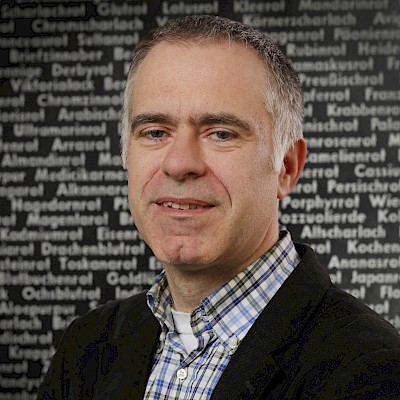 Daniel Baric
Daniel Baric
Daniel Baric studied History and completed German, Slavic and Hungarian studies in Paris, Berlin and Budapest. A former associate professor at the Department of German studies of Tours University, he is currently working at the Department of Slavic studies of Sorbonne University.
His researches focus on cultural transfers and interculturality in Central Europe, especially within the Habsburg Empire.
Abstract
To reflect upon the elaboration of patrimony policies and their endorsement by local actors means necessarily to take into account a wider context. The relationship of central imperial power with its Oriental circumferences is one of its major dimensions even more significant for the Austrian Empire.
There is a double aspect in Daniel Baric’s ongoing researches. They can be especially observed located among its geographical and historical boundaries. On the one hand, we can find a focus point on imperial Viennese institutions as they are considered to be an instrumental in the genesis of modern patrimony policies. On the other hand, there is a specific study revolving around the most peripheral provinces of Austria-Hungarian, Bosnia-Herzegovina and the Adriatic coast under Austria-Hungarian administration (1878–1918)
Our considerations will be concerned by the tremendous consequences due to the evanescence of the Austro-Hungarian Empire in the domains of embellishment policy and cataloging process.
Archeologists had indeed to find new ways of protecting patrimony through the implementation of new museums and university chairs (i.e. Carl Patsch in Sarajevo and then Vienna, Anton Gnirs in Pula and then at Loket). This process had been achieved by overcoming imperial structures that had collapsed in 1918.
Both of them were scholars born in Bohemia and trained in Prague. In accordance with their acknowledged expertise, they were sent to the Slavonic speaking provinces in the South of Austria-Hungary. They also both finished their researches once they went back to Bohemia and Austria.
The mainstream archeological researches were modified due to political changes and their own departure from their first fields of excavation. De facto, studies on romanization and imperial latinity that were so strongly developed in the Austria-Hungarian period were no more dominant. A new interest emerged for all things medieval and national, giving way to a new paradigm in archaeology.
The tight ties between biography and topography shall be addressed, in regard with current researches based on (mainly autobiographical) manuscripts due to be published.
Daniel Baric’s bibliography
Publications
1. Langue allemande, identité croate. Au fondement d’un particularisme culturel, Paris, Armand Colin, 2013. (Croatian translation : Zagreb, Leykam, 2015)
As an editor
2. Identités juives en Europe centrale, des Lumières à l’entre-deux-guerres, with Tristan Coignard and Gaëlle Vassogne, Tours, Presses universitaires François-Rabelais, 2014.
3. Archéologies méditerranéennes, Revue germanique internationale, 2012.
4. Mémoire et histoire en Europe centrale et orientale, with Jacques Le Rider and Drago Roksandić, Rennes, Presses universitaires de Rennes, 2010.
From one justice to another. Narratives of injustice by the executives of the former regime in Tunisia
Will host the 1st session of IMS FSV UK Research Seminar.
From one justice to another. Narratives of injustice by the executives of the former regime in Tunisia
Date: Monday 8 February 2021, 11:00
Place: online
Organizators: Institute of International Relations, Faculty of Social Sciences, Charles University
Language: anglais
Please report your participation in the seminars and get the link to the seminar :
https://ims.fsv.cuni.cz/en/research/area-studies-research-seminar

